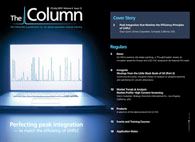Thought Leader
Agilent Technologies and the Agilent Foundation have announced that Professor Pauline Rudd has received an Agilent Thought Leader Award in support of her emerging glycomics research.
Agilent Technologies and the Agilent Foundation have announced that Professor Pauline Rudd has received an Agilent Thought Leader Award in support of her emerging glycomics research. The award includes a grant of funding and instruments to the National Institute for Bioprocessing Research and Training (NIBRT) in Dublin, Ireland. According to the company, the goals of the research are to develop novel approaches to analyse protein glycosylation, which will assist in the characterization of recombinant protein drugs, and to study potential glycan biomarkers associated with disease using liquid chromatography–mass spectrometry.
Maurice N. Treacy, CEO of NIRBT says that the partnership “will focus on multidimensional nanoscale LC–MS–MS separations for the comprehensive analysis of released oligosaccharides.” According to Treacy, combining the two groups’ expertise will “allow the development of novel technologies and complete solutions for rapid glycan analysis for use by the bio-pharmaceutical sector and in academia.”
This is the first award from the company’s new Thought Leader programme, which is reported to promote fundamental advances in the life sciences by contributing financial support, products and/or expertise to the research of influential thought leaders.
For further information please refer to www.nibrt.ie and www.agilent.com.
This story originally appeared in The Column. Click here to view that issue.
Reversed-Phases for LC Deliberately Doped with Positive Charge: Tips and Tricks for Effective Use
May 13th 2025In this month's edition of LC Troubleshooting, Dwight Stoll and his fellow researchers discuss both the benefits (improved peak shape/loading) and challenges (excessive interaction) associated with charge-doped reversed-phase (RP) columns for both analytical and preparative separations.
Evaluating the Accuracy of Mass Spectrometry Spectral Databases
May 12th 2025Mass spectrometry (MS) can be effective in identifying unknown compounds, though this can be complicated if spectra is outside of known databases. Researchers aimed to test MS databases using electron–ionization (EI)–MS.
Discovering the Hidden Plastic in Garden Compost with Pyr-GC–MS
May 12th 2025An Australian study used pyrolysis coupled to gas chromatography-mass spectrometry (Pyr-GC–MS) to analyze the presence of plastic polymers in commercial and homemade composts. LCGC International spoke to Simran Kaur—a PhD candidate at the Queensland Alliance for Environmental Health Sciences (QAEHS) at The University of Queensland in Woolloongabba, Australia—to find out more about her team’s findings.

.png&w=3840&q=75)

.png&w=3840&q=75)



.png&w=3840&q=75)



.png&w=3840&q=75)











